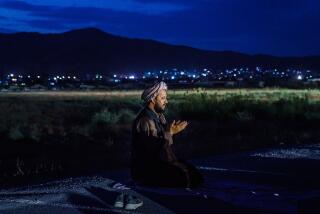Afghan Leader Names Warlord to Defense Job to Avert Trouble
- Share via
KABUL, Afghanistan — Realigning the new Afghan leadership’s ethnic balance to appease a dangerous holdout, Prime Minister Hamid Karzai chose flamboyant warlord Abdul Rashid Dostum on Monday to serve as deputy defense minister.
Dostum, whose political allegiance has switched nearly as often as Afghanistan’s rulers over the last two decades, seemed an unlikely choice for a Kabul government job in view of his career as local chieftain in the northern city of Mazar-i-Sharif.
But the appointment of the stocky, whiskey-drinking general also signaled the first attempt by the interim authority that will govern for the next six months to establish a conventional military.
Karzai said he had named Dostum to serve as deputy to Defense Minister Mohammed Qassim Fahim so as to take “the first step toward a national army.”
Long the undisputed leader of the Mazar-i-Sharif fiefdom, the 47-year-old Dostum, an ethnic Uzbek, had complained that his ethnic group was poorly represented in the new, 30-member Cabinet. The Cabinet took power from Northern Alliance troops Saturday.
Dostum had threatened to ignore the interim authority, hinting that the government--selected at talks in Germany this month--was a product of foreign intrusion.
But he relented under pressure from the United Nations and major international powers striving to support the first attempt at civilian rule here in nearly three decades.
Dostum showed up at the inauguration ceremonies Saturday unshaven and dressed in camouflage military garb, while the rest of the honored guests sported dapper suits or festive tribal costumes.
The general, who was at one time aligned with the Soviet occupiers of his homeland, still commands a powerful private militia and remained a threat to the stability of the new leadership, which has called for disarmament of unauthorized forces.
Unlikely to persuade this hard-nosed warlord to disband his forces, Fahim and Karzai appear to have opted for a marriage of convenience instead.
Dostum’s partnership with Fahim in the first weeks of the U.S.-led bombing campaign against the Taliban proved decisive in driving the fundamentalist regime out of power. But he has a reputation for fierce independence and ruthlessness and is not known to be close to other Northern Alliance commanders.
“I thank Gen. Fahim for selecting me as his deputy,” Dostum told journalists in his usual gruff manner.
A former Communist, Dostum was driven out of Mazar-i-Sharif by the Taliban in 1998 and fled to Turkey. He returned to Afghanistan in April.
While in power in the northern city, he issued his own currency, outfitted his own army, set up his own transport, health and education systems and vowed never to be ruled by the fanatical Taliban, which placed severe restrictions on women and outlawed alcohol and music.
In other developments, the United Nations helped the new ministries get to work despite a lack of every basic necessity by providing $600,000 worth of “start-up kits”--desks, computers, cars and drivers, stationery and paper clips.
The world body will provide an additional $25 million over the next six months to pay government salaries and help establish such vital components of a civilian infrastructure as courts, public works and reliable security.
A U.N. needs-assessment report over the weekend estimated that it will take at least $9 billion to help Afghans rebuild their shattered country after 23 years of occupation and civil war.
More to Read
Sign up for Essential California
The most important California stories and recommendations in your inbox every morning.
You may occasionally receive promotional content from the Los Angeles Times.











